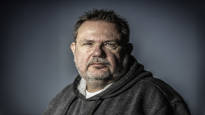Misuse of history is a widely used way to manipulate people. That’s why dictators like Putin are interested in history, Riiheläinen writes.
Janne “Rysky” Riiheläinen security policy observer
When Trumpian media personality Tucker Carlson interviewed the Russian president in February Vladimir Putin, many people’s attention was drawn to Putin’s centuries-long history lecture. It’s not good television, so to speak, when you spend the first half hour of an interview explaining in excruciating detail why Russia is justified in acting as it does.
This lecture was laughed at and about it were shown to be incorrect perceptions. But above all, it was considered a bad performance. The background was the idea that no one is interested in the history of others on such a thorough level.
This is not at all the first time Putin justifies his actions with history. His his long text National Interest – magazine 2020 presented the history of Russia in the 20th century exactly as his power needs it. Half a year before the big attack on Ukraine, a historical essay appeared from Putin, in which he summarizes his views on the history of Russia and Ukraine.
With his activity in defining history, he has at the same time elevated himself to the highest interpreter of history in the kingdom. In Russia, history is what Putin dictates.
He has elevated himself to the highest interpreter of history in the kingdom.
School books are currently being updated and the state apparatus is already in place long sought to make “wrong” historical interpretations punishable. History in Russia is at least as autocratically controlled as today.
Central to these historical interpretations of Putin’s Russia is that Russia has always fought on the side of good, and evil has always threatened it. Russia has been mistreated and Russophobia explains the reactions of other countries, not Russia’s own actions.
Past wrongs are a special way in which current actions can be justified almost unanswerably. This involves a professor by Timothy Snyder created by the idea of how dictatorships’ conceptions of history are the politics of eternity.
In the politics of eternity, the threats of the past continue to repeat themselves, over and over again. In Putin’s Russia, the West is constantly presented as threatening and treacherous.
The myth of the besieged Mother Russia has been around for centuries. Russia has indeed been attacked many times over the centuries, and therefore there are grounds for this idea in history. Just as it can be found that Russia has been attacking the West and the East for centuries.
History and past injustices are a way for people other than Putin to justify their own actions.
The politics of eternity are also visible Donald Trump’s in the way of describing the world. The United States is a chosen nation that is threatened by the rest of the world in many ways. Trump politicians also oppose teaching critical race theory, according to which racism is an influential part of US history. By denying the theory, in practice one wants to deny a part of one’s own history.
The ongoing war in Gaza is full of historical dimensions. In the conversation, centuries and millennia with real and imagined events repeat themselves constantly. History and past injustices are a way for people other than Putin to justify their own actions.
Through history we form understanding of what and who we are. Therefore, through history, it is also possible to change our self-image. History also easily lends itself to many different interpretations, and with the help of compelling stories it is easy to feed these concepts to people.
Remembering history and dealing with it directly and honestly is the only way to build peace between people’s ears, from where it will spread elsewhere over time. The previously mentioned historian Timothy Snyder names such an alternative as the politics of responsibility. It is based on facts and equality, giving a person the opportunity to see the world as something other than an inevitable confrontation.
Remembering history and dealing with it directly and honestly is the only way to build peace between people’s ears.
In Russia, this honest meeting of history has not been done. Without it, the country and people cannot live sustainably in harmony with themselves and the rest of the world.
Responsible and honest history must be nurtured, invested in, and also taught in schools and disseminated in the media. History is not just stories about the past, but a powerful force that affects today and tomorrow.
Janne Riiheläinen
The author remembers that as a small boy he read Grimberg’s History of the Nations at his grandmother’s and wished that we had as great a history as the Greeks.
